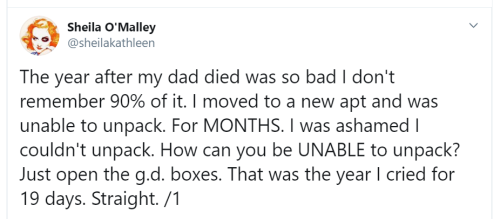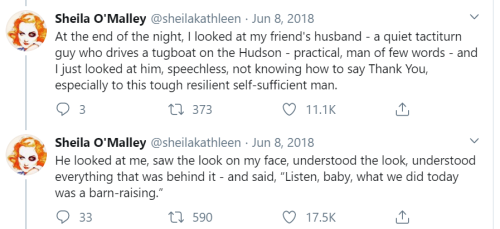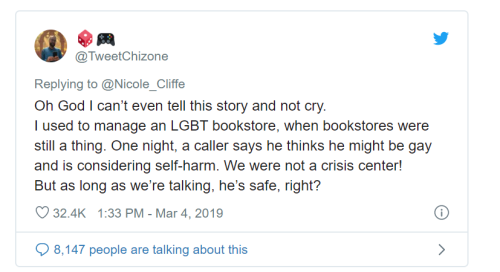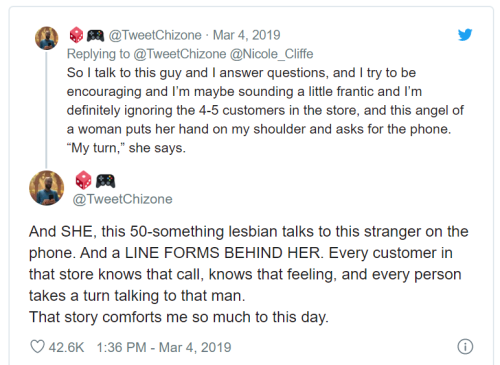It’s Okay To Be Annoyed At Social Distancing. It’s Okay To Be Disappointed Your Favorite Event Was
It’s okay to be annoyed at social distancing. It’s okay to be disappointed your favorite event was canceled or frustrated with online classes or online work. It’s okay, feel the way you’re feeling, we need room for that.
But remember, herd action is a powerful thing, we aren’t doing this for just you or me or one single person. We’re doing this for the elderly and immunecompromised, we’re doing this for the health care professionals so they don’t get too overwhelmed. We’re doing this for more than just ourselves. This is collective action at work.
And it is the group that lifts that barn when no one person can



it is the group that takes turns talking to the man down during the worst day of his life


it’s the group that gets out the wet wipes and quietly takes down hate symbols

and we don’t do that for ourselves. We do that because there is a love for strangers, a love for people we don’t know, and a dedication to others that is more than just “me” and “survive” and us vs them.
It is easy to feel alone in these times when we are literally meant to be alone, but this too is a means of care, this too is an act of love. And I think, I really do, I think that’s worth holding onto.
More Posts from Zella-rose and Others
Hey friend, in case no one told you today:
I just thought it may be a good time to tell you that you did great today. Even if things weren’t perfect, you did your best.
I see your hard work and I see how much it took to do the thing. Great job!
I’m really proud of you.
september will be kind. september will be magical. september will bring the missing energy. september will be working towards our goals and self. september will be a month full of growth.
Always defend your right to heal at your own pace. You are taking your time. You are allowed to take your time.
Unknown (via onlinecounsellingcollege)
Hi! Hope you don’t mind if I take a different angle here:
It is absolutely possible to experience some symptoms but not all, and still need and deserve help.
I’m kind of inferring, Anon, so this might not be what you’re talking about. Let me say up front that if you want to pursue an official diagnosis, for any reason, that’s totally fine!
But also?
You don’t have to be diagnosed for your struggle to be valid.
You don’t even have to be diagnosable.
And you don’t have to reach a “bad enough” point before you deserve to feel better.
Our culture puts forward the idea that only some people – people with Real Problems™ – get to have feelings, need help, or spend time trying to be happy. But that’s complete nonsense. Everyone needs to do those things, and everyone deserves to.
It’s okay to recognize how miserable you feel, or admit how much you’re struggling! You’re allowed to care about being happy.
You’re a good enough, real enough, valid enough person already. Your feelings matter. You matter -- and you don’t have to do anything to “earn” that, or to deserve to feel better and be happy.
Now…
Having a name for a specific condition or group of conditions, like AvPD and PD’s in general, is useful because similar problems usually behave in similar ways. (And honestly! So many PD’s have overlap!)
These labels aren’t a permanent stamp of “Here’s What’s Wrong With You.” They exist basically to point you in the right direction – to help you understand what’s happening, and which treatments are likely to help you.
If you relate to the experiences of people with AvPD, then the treatments that help AvPD will probably help you, too. Even if you never meet the official criteria for “having the disorder.”
Maybe you’re just Avoidant-ish … but you might discover that solutions like DBT, self-care, and social support still work really well to help you function and live the way you want.
The most important thing is finding things that work for you. And maybe getting an official diagnosis is part of that process for you. If so, that’s fantastic, good luck! But, it’s not a prerequisite.
You’re allowed to need help at any point, so don’t wait for that moment before you start to work on getting better. We are all learning, growing and trying to take care of ourselves. And you belong here just as much as the rest of us.
<3
is it possible to experience some symptoms of avpd (or any pd) but not all and still have avpd? (it's ok if not, you don't need to spare my feelings haha)
Hello.
Yes and no. It depends what you mean. The current diagnostic criteria states 4 out of 7 symptoms need to be present in order for a formal diagnosis plus the general PD criteria. You definitely don’t need all of them but you do need 4 or more. For more information, visit our What Is AvPD? page.
- Jay.
Hey everyone!
So, I’ve been getting a fair number of asks recently, which is great! I love hearing from all of you.
But if you’re waiting for a reply, please understand that I might not get to it for a while. I've been struggling to keep up with the basics lately; even writing my regular posts, although I have a lot to say.
Hopefully things will get better soon, and I’ll get back to it! But in the meantime...
Please remember:
You matter.
You are good enough.
You deserve to be happy.
And you can heal.
If you’re feeling lost, surround yourself with things that remind you of what’s important to you, and people that remind you of who you want to be. Build your inspiration into your life.
Take time for yourself. Be kind to yourself.
Be open to learning.
And at the end of every day, come home to yourself and say hello again.
<3
there’s something about living life deliberately…wearing clothes that you actually want to and that you feel reflect you and your style not just because you’ve had them for years and don’t know what else you would throw on….listening to songs and creating playlists that excite you and represent your actual mood not just listening to songs that you’ve had downloaded for years that don’t make you feel anything special anymore…it’s VERY easy to stay with what you’re comfortable and it might take a bit of experimenting before you find what feels like a deliberate choice that reflects more of YOU but it’s absolutely worth the leap of faith you may have to convince yourself to make in order to stop feeling like a passenger in your own life
Sorry for being vague. Well, I have a pretty good relationship with my parents, but they get irritated and sometimes angry because of my sensitivity and how hard it is for me to approach someone and hold a conversation, or do something simple like order food. They tell me that I need to get over it and act appropriate for my age. I want to talk to them about my AVPD so that they might better understand why I act like this and possibly be able to help, or at least not put as much pressure on me
Thanks so much for clarifying! I’m glad you did, because this turns out to be a very different post than I was planning to write.
First of all, here’s some really good clinical descriptions of Avoidant Personality Disorder: Cleveland Clinic, and DSM.
The most fundamental thing:
You don’t experience the world the same way your parents do.
You live in the same world, of course. But the way you perceive, interpret and experience it, is very different. It’s like your brain applies a different filter.
You have certain specific needs, ones that your parents do not have.
That means they can’t rely on “what works for them” as a guide to what will work for you.
(Further, excellent reading: the Usual Error.)
The fact is, certain things are actually harder for you than for most people. And certain things are actually damaging to you, even though they might not damage others.
It’s a real issue. Your parents need to understand that you can’t turn this off.
It got built-in, which is the whole problem; everything grew around it. It’s integrated with your entire personality and the way you exist in the world.
You can’t choose which parts of your life it affects or doesn’t. By definition, a PD harms almost every aspect of your life, whether you want it to or not.
And this fact doesn’t change just because someone is mad at you or is being inconvenienced by your difficulties.
Becoming un-disordered is a very, very intricate and painstaking process, and it does not happen by force.
Personality disorders are complex.
AvPD is part anxiety disorder, part codependency/boundary problems, part emotional dysfunction; and like other PD’s, it’s viciously self-reinforcing.
(Social anxiety could be a helpful frame of reference for your parents. AvPD is like social anxiety, but different & more complex, so it’s tougher to deal with.)
It is very hard to get out of the PD cycle. That’s why every one of us needs a lot of help before we can find our way out.
Personality disorders mean inflexibility.
Part of that is, we take the same approach to all kinds of different problems. Even when a different solution would work better, we cling to avoidance.
Other people can watch us do the same thing over again, even though it was a disaster the last three times, and wonder why we can’t learn.
It’s not that we don’t know how things “should” be, or how we “should” act. We’re already perfectionists! We don’t need you to tell us.
And when people announce that we’re failing, or point out what we’re doing wrong, or how to do it better, that makes it worse.
It directly feeds our perfectionism, our fear of criticism, and our avoidance.
Knowing doesn’t fix it.
It’s not that kind of problem.
That’s why nobody can “snap us out of it” or make us “get over it.”
What we need is, to be given the chance to heal and grow.
We need to be cared for, accepted, and supported.
People with AvPD especially need help to get out of it. Avoidance keeps us in an ever-tightening loop of limited experiences. And then we have fewer opportunities to try new things; fewer chances to become more flexible.
It’s reallllly hard for us to “accidentally” get better.
Recovering from a personality disorder is a process of slowly untangling all the messed-up stuff in our head, and learning good useful stuff to replace it.
It’s kind of like “remedial” emotional education.
This is where therapy really shines – that’s what it’s for. A therapist can teach you about emotions, how to deal with them, and how to get your needs met.
But even further than that …
The relationship you have with a well-matched therapist is a corrective experience for you.
The things that led to this disorder, whatever they were, happened in the dimension of relating to others. You have emotional learning from that. It can’t be changed by thinking about it, or by willpower.
It has to be overwritten, by a new, healing connection with another human being.
Great therapy can do this. Certain great friendships or other relationships can too, if you approach them consciously and carefully.
But again: This doesn’t happen by accident. Your parents need to know that they can’t just ignore this problem and hope it will go away, because it won’t.
If you’re close to someone with AvPD…
… the very best thing you can do for them is make sure they know that you accept who and how they are; that you support whatever they want to do; and you love them unconditionally – there’s nothing they can do that will end your positive regard for them.
And then, prove it in actions. Even when it is not easy for you to do.
Having one little safe corner in our lives can help us cope, a lot.
And, Anon, that sounds like what you’re asking for. Hopefully, your parents will be patient and sympathetic enough to give that to you. <3
(Some more stuff specifically for/about them, under the readmore.)
So, your parents need to know that this isn’t new.
The fact that you’re only now telling them about it, doesn’t mean it just started happening.
This is a thing that has been there for a very long time. It is your “normal.” The only difference is, now you (and your parents) know there is a name for it.
Denying the name or denying that you have any problems …..isn’t going to remove the problems.
Your parents are probably going to have a lot of feelings about hearing this.
It’s hard to learn that your kid is struggling, that they have a real problem and you can’t make it go away. It is normal to wonder if it’s your fault or try to figure out what you did wrong.
It’s OK to have emotional reactions to this news. Absolutely fine.
But your kid needs you to be present with them right now, and they need you to listen to them, and take them seriously.
They need you to believe them.
If you need to go sort out your own feelings about it before you can do that, tell them so, go do that privately, and then come back to continue the discussion once you’re able to be supportive.
Be patient. Try very hard to be open-minded. Be willing to learn.
It is a huge act of trust for them to tell you about this stuff. Don’t let down that trust. Honestly, you’ll probably never get it back.
Here are some typical reactions when somebody finally gets diagnosed, or discovers there’s a name for what they experience (self-diagnosed).
Understandably, when you find out that your problems are a Real Thing, you’re pretty delighted. And you want to share it with the people close to you.
You are like, “yeah, woo! Finally, there is a name for this! There is vocabulary to express how it feels! There are other people who have this thing too! It’s not uncharted territory! I’m not alone!!!”
And then you are like, “Wait. People have gotten mad at me for the things I’ve done because of this problem, and that wasn’t fair. That hurt me. It wasn’t my fault, and I’m not a bad person. I’m not broken or defective. I’m not lazy. I’m not selfish. I’m doing the best I can to survive my own mind.
“How can they complain about getting splashed from standing next to me, when I’m the one getting the bucket of water dumped on my head?”
These are all, totally normal reactions to finally getting a diagnosis/finding words for what you’re dealing with. They are OK to feel; they’re just feelings, not moral judgments; and they are not anybody’s job to fix.
Generally, there’s two basic things you want to hear from your family.
First: “Wow, I had no idea you were experiencing this. That must have been so difficult and lonely. These issues aren’t your fault, and I never should have blamed you for having a hard time doing things. I’m sorry. What can I do to help you now?”
Second: “I am so happy for you! You’ve had to work so hard just to get by, and now you know the reason. Now you can actually figure out how this works and how to have a life and be happy! This is amazing, we are so proud! Tell us how we can support you so you can have an awesome life!”
And then you tell them what you need, which often comes down to: “Right now I just need to be reassured that you still love me, and then I want to discuss this again once I’ve figured out what to ask for.”
It’s a hard adjustment for a family (or a couple, or whatever) to make. And it’s scary, for everyone.
But if everyone remembers to breathe a little, to not assume the worst, and try listen to each other – you can get through it. And it can turn out to be a really good thing.
Hi! Sorry to bother you, but I'm almost certain I have AVPD and I'd like to explain it to my parents, since they've gotten upset over symptoms of AVPD that I've expressed and I want to tell them why I act like that. But they don't really think that PDs are a thing that exists. so how could I explain it to them so that they understand? thank you in advance !!
Hi there anon!
Wow, there’s a lot to unpack here. The most important is probably:
What you want to accomplish by telling your parents
What your relationship with your parents is like
Would you mind sharing a bit more about the situation?
-
 seraphasia liked this · 1 month ago
seraphasia liked this · 1 month ago -
 gaia-lapis-77 liked this · 5 months ago
gaia-lapis-77 liked this · 5 months ago -
 nessiakalreu liked this · 1 year ago
nessiakalreu liked this · 1 year ago -
 cypresstiger reblogged this · 1 year ago
cypresstiger reblogged this · 1 year ago -
 iamascaryhuman reblogged this · 2 years ago
iamascaryhuman reblogged this · 2 years ago -
 zombie-jackalope liked this · 2 years ago
zombie-jackalope liked this · 2 years ago -
 hazeybluesoul50s liked this · 2 years ago
hazeybluesoul50s liked this · 2 years ago -
 cainite-bite liked this · 2 years ago
cainite-bite liked this · 2 years ago -
 cthonic-the-hedgehog liked this · 2 years ago
cthonic-the-hedgehog liked this · 2 years ago -
 black-pepper-dreams reblogged this · 2 years ago
black-pepper-dreams reblogged this · 2 years ago -
 auroreanchris reblogged this · 2 years ago
auroreanchris reblogged this · 2 years ago -
 shastiriviera liked this · 2 years ago
shastiriviera liked this · 2 years ago -
 canalithine reblogged this · 2 years ago
canalithine reblogged this · 2 years ago -
 cyberkittyyuki reblogged this · 2 years ago
cyberkittyyuki reblogged this · 2 years ago -
 cyberkittyyuki liked this · 2 years ago
cyberkittyyuki liked this · 2 years ago -
 bothebrave liked this · 2 years ago
bothebrave liked this · 2 years ago -
 black-pepper-dreams reblogged this · 2 years ago
black-pepper-dreams reblogged this · 2 years ago -
 rat-deity liked this · 2 years ago
rat-deity liked this · 2 years ago -
 bunny-skullz reblogged this · 2 years ago
bunny-skullz reblogged this · 2 years ago -
 anabsolutelyremarkableblog liked this · 2 years ago
anabsolutelyremarkableblog liked this · 2 years ago -
 memeticcontagion reblogged this · 2 years ago
memeticcontagion reblogged this · 2 years ago -
 memeticcontagion liked this · 2 years ago
memeticcontagion liked this · 2 years ago -
 not-a-regular-mom reblogged this · 2 years ago
not-a-regular-mom reblogged this · 2 years ago -
 micaleann reblogged this · 2 years ago
micaleann reblogged this · 2 years ago -
 micaleann liked this · 2 years ago
micaleann liked this · 2 years ago -
 my-thoughts-and-junk reblogged this · 2 years ago
my-thoughts-and-junk reblogged this · 2 years ago -
 l0n1m reblogged this · 2 years ago
l0n1m reblogged this · 2 years ago -
 l0n1m liked this · 2 years ago
l0n1m liked this · 2 years ago -
 stativus reblogged this · 2 years ago
stativus reblogged this · 2 years ago -
 honestlyjustablog liked this · 2 years ago
honestlyjustablog liked this · 2 years ago -
 stevenroogers reblogged this · 2 years ago
stevenroogers reblogged this · 2 years ago -
 cypresstiger reblogged this · 2 years ago
cypresstiger reblogged this · 2 years ago -
 kumajiro-00 liked this · 2 years ago
kumajiro-00 liked this · 2 years ago -
 daughterearth liked this · 2 years ago
daughterearth liked this · 2 years ago -
 onelonesock liked this · 2 years ago
onelonesock liked this · 2 years ago -
 mushinamas reblogged this · 2 years ago
mushinamas reblogged this · 2 years ago -
 mushinamas liked this · 2 years ago
mushinamas liked this · 2 years ago -
 aspen3345 reblogged this · 2 years ago
aspen3345 reblogged this · 2 years ago -
 miranda178 reblogged this · 2 years ago
miranda178 reblogged this · 2 years ago -
 marinettepotterandplagg liked this · 2 years ago
marinettepotterandplagg liked this · 2 years ago
